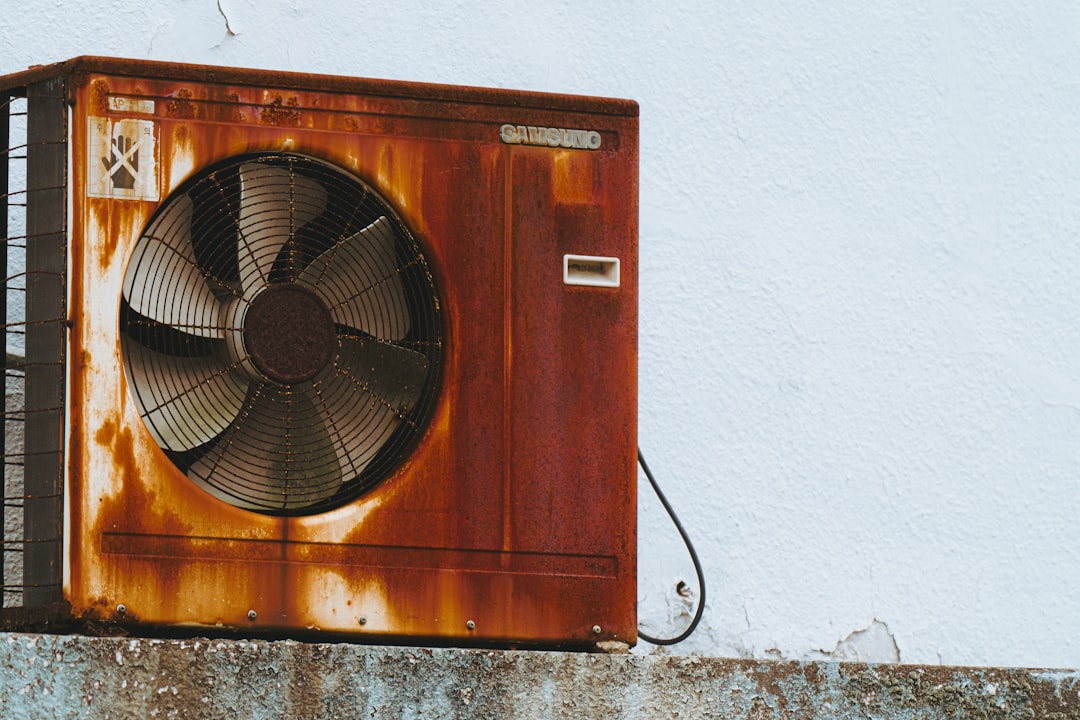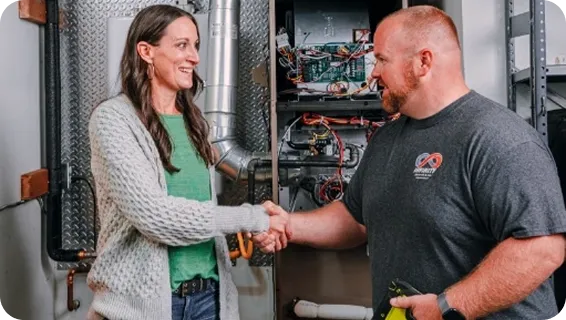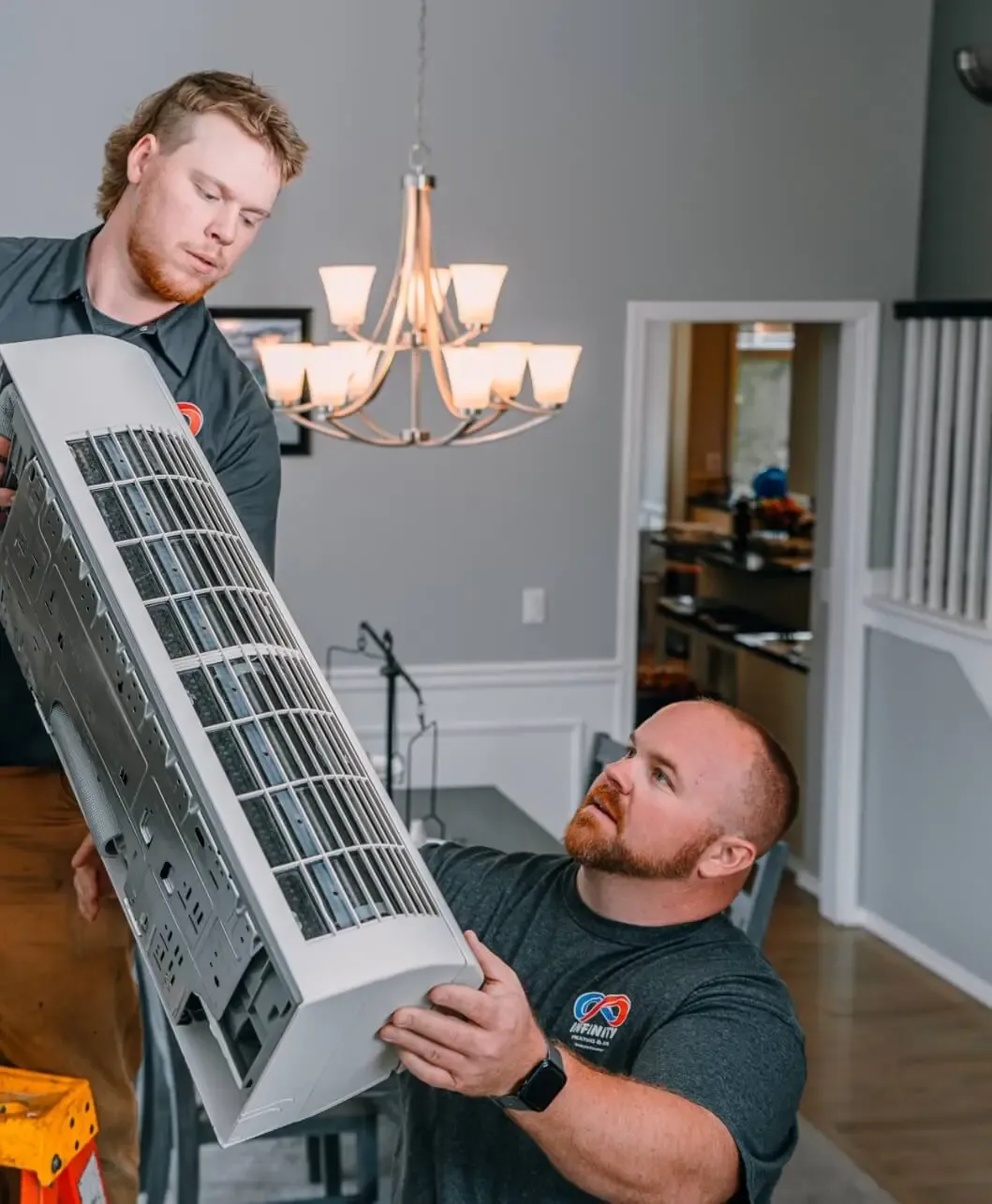
The Ultimate Guide to Air Conditioner Replacement: From Old to Cold
air conditioner replacement, HVAC services, air conditioning maintenance, signs to replace AC, benefits of upgrading AC, high-efficiency air conditioners
.webp)

Why Your Home Deserves Better Than a Struggling AC
Replace air conditioner systems when they can no longer keep your Northwest Washington home comfortable. While the decision isn’t always obvious, key indicators make it clear when it’s time for an upgrade.
Quick Answer: When to Replace Your Air Conditioner
- Age: 10-15+ years old
- Repairs: Frequent breakdowns or using the $5,000 rule (age × repair cost)
- Performance: Poor cooling, high energy bills, or inconsistent temperatures
- Refrigerant: Uses outdated R-22 (Freon)
- Efficiency: SEER rating below current standards
When your AC starts making strange noises, cools unevenly, or your energy bills keep climbing, it’s signaling a problem. In Northwest Washington, humid summers and unpredictable weather accelerate wear and reduce efficiency.
Modern air conditioners use 30-50% less energy than older models, offering superior comfort and air quality. With an average lifespan of 10-15 years, many homeowners wait too long to replace struggling systems, missing out on significant savings and comfort.
This guide will walk you through the warning signs, your replacement options, and how a new system can transform your home.

7 Telltale Signs It’s Time to Replace Your Air Conditioner
Recognizing when your air conditioner is ready for retirement can save you from sweltering summer days, high energy bills, and emergency repairs. Here are the clearest indicators that it’s time to replace air conditioner systems in your home.
Your AC Unit is Over 10-15 Years Old
The average lifespan of a central air conditioner is 10 to 15 years. As a system ages, its components wear down, causing it to lose efficiency with each passing year. The compressor works harder, coils collect debris, and seals can leak, all of which directly impacts your wallet. According to the U.S. Energy Information Administration (EIA) data on AC energy use, air conditioning can account for a significant portion of your power bills, and an older unit will be on the higher end of that range. In Northwest Washington’s climate, your unit might last closer to 15 years. However, once it crosses that threshold, major breakdowns become more likely and energy efficiency plummets.
Frequent or Expensive Repairs
When repair calls become a regular occurrence, it’s time to consider if you’re throwing good money after bad. A good guideline is the $5,000 rule: multiply your unit’s age by the estimated repair cost. If the total exceeds $5,000, replacement often makes more financial sense. For example, a 12-year-old unit needing a $500 repair (12 × $500 = $6,000) has crossed that threshold. This is especially true if your warranty has expired, leaving you responsible for all costs. Major component failures, like a compressor or evaporator coil, can be very expensive, and that money could be better invested in a new, reliable system.
Your Unit Uses R-22 Refrigerant
If your air conditioner was installed before 2010, it probably uses R-22 refrigerant (Freon). R-22 was phased out of production in 2020 due to its harmful environmental impact. This means R-22 is now incredibly scarce and expensive. If your system needs a refrigerant service, the cost can be prohibitive, often making replacement a better option. Modern air conditioners use environmentally friendly refrigerants like R-410A. Upgrading frees you from the high costs and limited supply of outdated refrigerant.

Beyond these major red flags, watch for other distress signals:
- Rising Energy Bills: If your bills increase without more usage, your AC’s efficiency is likely declining.
- Poor Cooling Performance: If some rooms are never cool enough, your unit can no longer meet your home’s demands.
- Strange Noises: Grinding, squealing, or banging sounds signal mechanical problems that need immediate attention.
- Unpleasant Odors: Musty smells can indicate mold, while burning odors suggest dangerous electrical issues.
If you notice these signs, especially in combination, it’s time to consider replacing your air conditioner to restore comfort and efficiency.
Repair vs. Replace: Making the Right Choice for Your Home
When your AC breaks down, you face a big decision: repair or replace? The right choice depends on your home’s comfort, your budget, and your long-term peace of mind.
When to Consider Repair
Repair often makes sense for a younger system with a minor issue. Consider repairing if:
- Your unit is under 10 years old and likely in its prime. An early problem usually points to a specific component, not total system failure.
- The repair is minor, like a clogged drain line or faulty thermostat. These are often quick, affordable fixes.
- Your system is still under warranty. Most warranties cover parts for 5-10 years, so you may only pay for labor.
- The issue is infrequent. A single problem on a historically reliable unit is usually worth fixing.
The Financial Case to Replace Your Air Conditioner
In many cases, it’s smarter to replace air conditioner systems. Consider replacement when:
- The unit is over 10 years old. Efficiency declines with age, meaning an older system costs more to operate. A new unit can pay for itself through lower energy bills.
- A major component fails. Repairing a critical part like the compressor or evaporator coil can be nearly as expensive as a new system.
- The warranty has expired. Without a warranty, you are responsible for all repair costs, which can quickly add up.
- The system uses R-22 refrigerant. The high cost and scarcity of this phased-out refrigerant make servicing older units impractical.
- You want long-term energy savings. New high-efficiency models use up to 30–50% less energy use than older ones, providing significant savings over the system’s lifespan.
ScenarioAC Unit AgeEstimated Repair CostDecision Factor (approx.)RecommendationMinor Issue, Under Warranty< 10 yearsLow$5,000 Rule (low result)Repair (Cost-effective, covered by warranty)Minor Issue, Out of Warranty< 10 yearsLow$5,000 Rule (low result)Repair (Still good value)Major Component Failure, Out of Warranty> 10 yearsHigh$5,000 Rule (high result)Replace (Poor long-term value, high cost)Frequent Breakdowns, Any AgeAnyAccumulatingHigh energy billsReplace (Unreliable, costly to maintain)Uses R-22 Refrigerant> 10 yearsRefrigerant rechargeHigh cost of R-22Replace (Expensive to service, outdated tech)
$5,000 rule we mentioned earlier? Multiply your unit’s age by the repair estimate. If that number exceeds $5,000, replacement typically makes more financial sense. It’s a simple way to cut through the emotion and focus on what’s best for your home’s future comfort.
Choosing Your New Cooling System: A Guide to Modern AC Options
Once you’ve decided it’s time to replace air conditioner, the exciting part begins: finding the perfect system for your home. Today’s cooling technology offers incredible options for reliability, efficiency, and your specific needs.

Why Proper Sizing is Crucial
When it comes to air conditioners, bigger isn’t better. Proper sizing is essential for comfort and efficiency.
- An oversized AC will short cycle—cooling the house too quickly and shutting off. This leads to uneven temperatures, poor humidity removal, and premature wear on the system.
- An undersized unit will run constantly, struggling to keep up on hot days and wasting energy.
The key to perfect sizing is a Manual J Load Calculation. This detailed analysis considers your home’s insulation, windows, sun exposure, and layout. If you’ve recently renovated, added a room, or upgraded windows, your cooling needs have likely changed, making a new calculation essential.
Understanding Energy Efficiency (SEER Ratings)
SEER (Seasonal Energy Efficiency Ratio) is like a “miles per gallon” rating for your AC: the higher the number, the more efficient it is. Older units had SEER ratings around 10. Today, the minimum is 13, with high-efficiency models reaching SEER 25 or more. You can learn more about What is a SEER rating? to see how this translates to savings. A higher SEER unit has a higher upfront cost but delivers significant energy savings over its 15+ year lifespan, often paying for the initial investment.
Key Considerations When You Replace Your Air Conditioner
When you replace air conditioner systems, you have several options beyond a simple one-for-one swap:
Central Air Conditioners are the most popular choice for homes with existing ductwork. An outdoor unit removes heat while an indoor unit distributes cool air through the ducts. Modern systems are much quieter and more efficient than older models.
Ductless Mini-Splits are ideal for homes without ductwork or for creating climate-controlled zones. Individual indoor units are installed in different rooms, all connected to one outdoor unit. This allows you to set different temperatures for each zone, offering customized comfort.
Heat Pumps provide both heating and cooling in one efficient unit. They function like a standard AC in the summer and reverse the process in the winter to heat your home by extracting warmth from the outside air. Heat pumps are incredibly efficient in Northwest Washington’s moderate climate. Learn More info about our heat pump solutions to see if one is right for you.
The right choice depends on your home’s layout and your comfort goals. Professional guidance is invaluable in navigating these options to find your perfect match.
The Benefits of Upgrading and What to Expect During Installation
When you replace air conditioner systems, you’re investing in your home’s comfort, efficiency, and air quality. Understanding the benefits and the installation process can make the experience smooth and stress-free.
Major Benefits of a New High-Efficiency AC
Upgrading to a new high-efficiency AC offers numerous advantages:
- Energy Savings: Modern units use Up to 30–50% less energy use than older models, leading to significantly lower utility bills.
- Improved Dehumidification: New systems are better at removing moisture, making your home feel more comfortable at higher temperatures and helping to prevent mold growth.
- Quieter Operation: Engineered for whisper-quiet performance, new ACs eliminate the rattling and humming of older units for a more peaceful home.
- Better Indoor Air Quality: Paired with advanced filtration, a new system circulates cleaner air and reduces allergens like mold and dust mites.
- Increased Home Value: A new, efficient HVAC system is an attractive feature for potential buyers, boosting your property’s value.
The Installation Process and System Improvements
Choosing a qualified professional is crucial for a successful installation. Our process ensures your new system performs optimally:
- Professional Assessment: We perform detailed load calculations to size your system perfectly for your home.
- Old Unit Removal: We safely remove and responsibly dispose of your old equipment and refrigerants.
- Ductwork Inspection: We check your existing ducts for leaks or damage that could compromise performance and recommend modifications if needed.
- New Unit Installation: We precisely install the new components, ensuring a “matched system” for peak efficiency.
- Testing and Calibration: We thoroughly test the system to verify it delivers consistent comfort and operates at peak efficiency.

Installation is the perfect time for optional upgrades to improve comfort and air quality:
- Duct Cleaning: Removes accumulated dust and allergens, ensuring your new system circulates clean air.
- Indoor Air Quality Systems: Integrate advanced air purifiers, UV lights, or dehumidifiers with your new AC for a healthier home. Explore our Indoor air quality systems to learn more.
- Smart Thermostats: These devices learn your preferences and optimize cooling schedules to maximize energy savings and comfort.
Frequently Asked Questions about Air Conditioner Replacement
When it’s time to replace air conditioner units, homeowners often have questions. Here are answers to some of the most common ones we hear in Northwest Washington.
What is the average lifespan of an air conditioner?
The average lifespan of a central air conditioner is 10-15 years. Several factors influence this, including:
- Climate: Units in milder climates like Northwest Washington often last longer than those in regions with constant, extreme heat.
- Usage Patterns: An AC that runs only during the hottest months will typically outlast one used year-round.
- Maintenance: Regular maintenance is the most important factor in extending your unit’s life. Annual tune-ups and prompt repairs can help your AC exceed the 15-year mark, while neglect leads to early failure.
If your unit is approaching this age and showing signs of wear, it’s time for a professional assessment.
How does a new AC improve home air quality?
A new AC improves air quality in two key ways. First, newer units are much more effective at dehumidifying, which helps prevent mold and mildew growth and makes your home feel more comfortable. Second, when you replace air conditioner systems, you can upgrade your filtration. Modern ACs can be paired with advanced filters or whole-home air purification systems to reduce airborne contaminants like dust, pollen, and pet dander. This combination of better humidity control and filtration creates a healthier indoor environment, which is especially beneficial for families with allergies or respiratory issues.
Should I replace my furnace at the same time as my AC?
If your furnace is also over 15 years old, it is highly recommended to replace both systems together. Here’s why:
- Matched Systems: Modern high-efficiency ACs perform best when paired with a compatible furnace. This “matched system” ensures optimal efficiency and reliability.
- Cost-Effectiveness: Replacing both at once saves on labor costs compared to two separate installations.
- Convenience: You avoid the disruption of a second installation and ensure your entire HVAC system starts fresh with new warranties.
Even if your furnace seems fine, if it’s old, replacing it with your AC prevents having to do another major installation in a year or two. Our team can assess both systems to help you decide on the most practical approach.
Your Path to Endless Comfort Starts Here
Deciding to replace air conditioner systems is a significant investment in your home’s comfort, health, and efficiency. As we’ve covered, signs like age, frequent repairs, poor performance, and outdated R-22 refrigerant indicate it’s time for an upgrade. A modern, high-efficiency system offers quieter operation, better air quality, and energy savings of up to 30-50%.
A new, properly sized AC increases your home’s value and provides reliable cooling you can count on. Whether you need a central air system, a ductless mini-split, or a heat pump, the right solution depends on your unique home in Northwest Washington.
At Infinity Heating & Air, we specialize in designing systems for endless comfort and health. Our team handles everything from assessment and sizing to professional installation, ensuring your new air conditioner performs at its best for years to come.
Ready to transform your home’s comfort? Find out more about our Air Conditioner Replacement services and let us help you make the smart choice for your home.

Endless Comfort
Starts Here
Our expert technicians are ready to serve you and your home.





